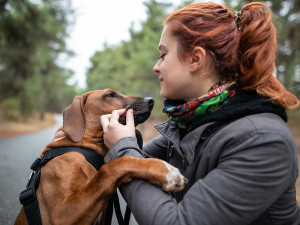Why Is My Dog Shaking? Causes and Treatment
A vet explains why the weather isn’t always to blame.

Share Article
In This Article:
What Is Shaking in Dogs? Reasons Your Dog May Be Shaking When To See a Vet
Dogs shake for a variety of reasons, both physical and emotional. If your dog is shaking, it’s important to try to determine the cause. Dr. Aimee Warner, resident veterinarian at Waggelopens in new tab, advises pet parents to first rule out pain or illness, particularly if the shaking is severe and persistent, or followed by symptoms such as loss of appetite or lethargy. Here are the most common reasons a dog shakes, from seasonal stress to deadly diseases.
What characterizes shaking in dogs?
Shaking comes in many forms, from little shivers to full-body convulsions. There’s a lot of overlap between the types of shaking.

Shivering: This usually consists of full-body, small contractions of muscles that can make your dog look like they’re vibrating.
Tremoring: This can look a lot like shivering but may be more localized and consistent. In short-haired dogs, fine-muscle tremors can look like worms crawling beneath the skin as the muscles contract and relax uncontrollably.
Regional shaking: This is a much broader, purposeful type of movement in the head or a limb. It’s generally intermittent and often indicates discomfort associated with the ear or the head. It can also indicate a neurological condition.
Myoclonus: Muscle contraction disease is an uncontrolled, sudden, brief jerking of a group of muscles that’s often rhythmic and repetitive.
Convulsions: These are characterized by generalized uncontrolled muscle activity, often violent in appearance.
Reasons your dog may be shaking
Shaking is a non-specific symptom in dogs, meaning it’s caused by many different situations and conditions. Because dogs can’t talk, it can be challenging to pinpoint the cause. Below are common reasons why your dog may be shaking.
They are scared or stressed.
Dogs get freaked out just like humans, and some tremble when they’re scared. Causes of stress or fear, like fireworks or a leaf blower, can be unsurprising. Some dogs are also just scared of new things, people, and places. A rescue dog, in particular, needs time to adjust to their new surroundings. A familiar thing to you, such as an oscillating fan on a hot day, could be utterly terrifying to a dog who’s never seen one. Be patient with them: Understanding where they’re coming from can help make sense of their shaking.
If the shaking persists, it’s probably not caused by an isolated situation or environmental trigger. Dogs with an anxiety disorder will shake as well as pace, pant, whine, and lick their paws. Anxious dogs can also shut down, freeze in fear, or frantically try to escape a situation. Consult a certified behaviorist for training techniques to assuage your dog’s anxiety. Always try to exhaust all training options first, but if your dog isn’t making progress after months of work, talk to your vet about anti-anxiety medication.
They are excited.
Shaking from excitement is less worrisome. Your dog may shake (and whine and pee) when you come home from work because they’re so happy to see you. Getting equally excited — as you obviously are — will only reinforce this behavior. If you feel like your dog is getting too worked up or needs to stay calm for medical reasons (they have heart problems, are recovering from surgery, or are a fragile senior), try to make comings and goings more chill. As hard as this may be, don’t acknowledge your dog when they’re frenzied with excitement. Wait until they calm down before giving them the affection they seek.
Your dog is shaking off excess water.
Eunice Arauz, founder of Pets Avenueopens in new tab, says shaking off water or mud is a mechanical reflex similar to natural shaking in a rhythmic pattern to dry off. “It’s intrinsic and automatic,” Arauz says.
They are seeking attention
Dogs can’t tell time, but they certainly know when it’s time for a walk, a meal, or some attention. If your dog feels like you’re ignoring their very important needs, they may tremble or shake out of frustration. This trembling will usually stop as soon as you acknowledge them and show some interest in doing whatever they’re demanding.
Your dog is freezing.
“Chihuahuas are known for shivering and shaking,” veterinarian Dr. Sara Ochoaopens in new tab says. “They tend to always be cold and want a blanket to snuggle up with.” If chilly sidewalks cause shaking, feel free to use it as an excuse to play dress up with Kinship’s recommended cozy sweaters.
They have an ear infection.
“If you notice your pet is suddenly shaking their head a lot, an ear infection could be to blame,” Dr. Ochoa says. This behavior could be coupled with a funky smell emanating from their ears, increased discharge, redness in the ear canal, and swelling of the outer ear. Because the inner ear is what keeps you (and animals) balanced, your dog may also have an odd head tilt, back-and-forth eye movements, and appear otherwise off-balance and uncomfortable.
Dogs with floppy or hairy ears, like Cocker Spaniels, Basset Hounds, and Old English Sheepdogs, are more prone to ear infections. So are dogs with crudely cropped ears, as is sadly the case with some Pit Bulls and Dobermans. If you see any of the above, call your vet about antibiotics to clear up the infection.
Your dog ate something toxic (or feels sick for another reason).
Poisoning will cause a dog to shake. Toxic food, plants, and home lawn chemicals include chocolate, moldy food, xylitol (common in sugar-free gum and baked goods), marijuana, antifreeze, and fertilizer. If you suspect your dog has swallowed something poisonous, call your vet immediately.
Nausea, motion sickness, and pain can also cause a dog to shake. Animals often don’t show pain until it’s too much to bear (a survival mechanism), so shaking is a clue something’s amiss. Don’t just wait for the shaking to subside: Book an appointment with your vet, or head to the ER if your dog can’t settle.
They have generalized tremor syndrome (GTS).
Any breed can be affected by GTS or “shaker syndrome,” but it’s most common in Maltese, Poodles, West Highland White Terriers, and other small dogs with white fur — so much so it’s been dubbed the “little white shaker disease.” The conditionopens in new tab is caused by inflammation in the cerebellum, the part of the brain that controls coordination and regulates voluntary muscle movement. It can occur when dogs are asleep or awake. The cause of GTS is still unknown, but it’s thought to be an autoimmune disease because it responds to steroid treatment. Again, see your vet if there isn’t an obvious reason why your dog is shaking.
Your dog has low calcium levels or other metabolic issues.
A number of different electrolyte problems can cause tremors in dogs. One of the most common is seen in mothers nursing their rapidly growing puppies. Making milk uses up a lot of calcium, and sometimes a nursing mother’s body just can’t keep up. She’ll deplete her own calcium stores to feed her puppies and experience hypocalcemia (low blood calcium). In dogs, this condition is called eclampsia (a different type of eclampsia than in pregnant humans). It causes facial itching, muscle tremors, and generalized shaking. It’s treatable but requires emergency intervention by a veterinarian.
They have distemper.
The first sign of distemper, a deadly virus, is discharge from the eyes and nose, so it’s not always easy to diagnose early. What follows is coughing, fever, diarrhea, and vomiting. Then come the shakes. As the disease progresses, it attacks the central nervous system, and dogs begin showing neurological symptoms like uncontrollable muscle twitches, convulsions, and seizures. Distemper is part of a puppy’s core set of vaccines, so it’s mostly seen in young puppies who have not yet received all their shots.
“Distemper is so serious because there is nothing that can treat this disease. We can usually only provide supportive care,” Dr. Ochoa says. “With these dogs being so young, their immune systems cannot fully help them fight this disease, and it is usually fatal. If not, it causes neurological issues, many of which are not reversible.”
Distemper is also highly contagious, so if you adopt a puppy from somewhere that doesn’t routinely vaccinate litters, get your pup checked by your vet ASAP.
Your dog has a seizure condition or muscle weakness.
Tremors preceding a seizure or associated with muscle weakness are accompanied by other symptoms, Dr. Warner explains. “Seizures bring on symptoms beyond just tremors because they cause dogs to collapse and drool and have wild, uncontrolled movements and confusion following the seizure,” Warner says. The tremors associated with muscle weakness occur when a dog moves or tries to hold a position.
Shaking accompanied by stiff limbs, loss of coordination, and disorientation are signs of a neurological issue that needs immediate attention, Warner says.
When should I be concerned about my dog’s shaking and see a vet?
When in doubt, see your vet. This is especially true if the cause of your dog’s shaking isn’t clear, or if your dog’s shaking doesn’t go away (or worse yet, intensifies). A veterinarian will examine your pup, run tests if necessary, help diagnose what is wrong, and then offer a treatment plan.
Bottom line
Dogs shake to communicate excitement, fear, stress, discomfort, or illness. If the cause isn’t immediately apparent (like a thunderstorm or sub-zero wind chills), trying to pinpoint why will take some detective work. Dogs who are scared or stressed will shake the same as an excited dog.
In most cases, shaking is related to situational or environmental triggers. It’s concerning when there’s no noticeable cause, it doesn’t subside, or it’s accompanied by other unusual behavior. “Concern only really grows when shaking is repeated or disconnected from rational reason — like excitability, overstimulation, or transitions,” Arauz says. “What I consistently encourage owners to do is watch what’s happening around their dog leading up to and after the shaking, and that will usually give you the answer. If they’re happy, looking alert, and still engage normally, it’s typically nothing to be concerned about.”

Catherine Fahy Green
Catherine Fahy Green is a journalist turned copy and content writer. As a pets writer, she focuses on and is fascinated by animal body language because there's so much to learn from and about animals by spending time in their presence and observing their physical cues.
Her work as a PR specialist appears in national trade media as press releases and stories about exciting new products people should try. She lives with her family in Western Massachusetts, where she listens closely to the stories her two dogs, flock of chickens, and four horses tell her. She spends her weekends at horse shows with her daughter.

Dr. Bartley Harrison, DVM
Dr. Bartley Harrison is a veterinarian with more than 19 years of experience. He has treated a variety of species in emergency and speciality practices for both large and small animals. His primary interests as a vet are emergency medicine and critical care.

Colleen Stinchcombe
Colleen Stinchcombe lives near Seattle, WA, where she works as a writer, editor, and content strategist. Her two rescue pups wish she were a professional ball-thrower.
Related articles
Does Your Dog Need Anti-Anxiety Meds?
How to cope with dog anxiety—from training to medication.
![Older dog playing with ball in a green field]()
Dog Arthritis Treatment: How to Relieve Arthritis Pain in Dogs
Tips for treating achy joints — from medications to massages.
![dog with tennis ball]()
Yikes, Your Dog’s Toys May Be Toxic
For starters, many tennis balls for pets are loaded with lead and arsenic.
![dog using diy paw wax to protect paws in snow standing next to fence]()
Cold Weather Is the Nemesis of Dog Paws. Here’s How to Help
We all have to up our moisturizing game in the fall and winter.
![A couple bundled up for winter standing outside in the snow with their dog.]()
Can Dogs Get Frostbite?
Yep, all those warnings your mom gave you as a kid apply to your dog, too. Learn how to keep your pup safe in the cold.
![Redhaired woman holding her Rhodesian ridgeback dog]()
How to Treat Epilepsy in Your Dog Holistically
Watching your pet suffer a seizure can make you feel helpless. We asked three veterinarians to weigh in on natural remedies that show promise.










